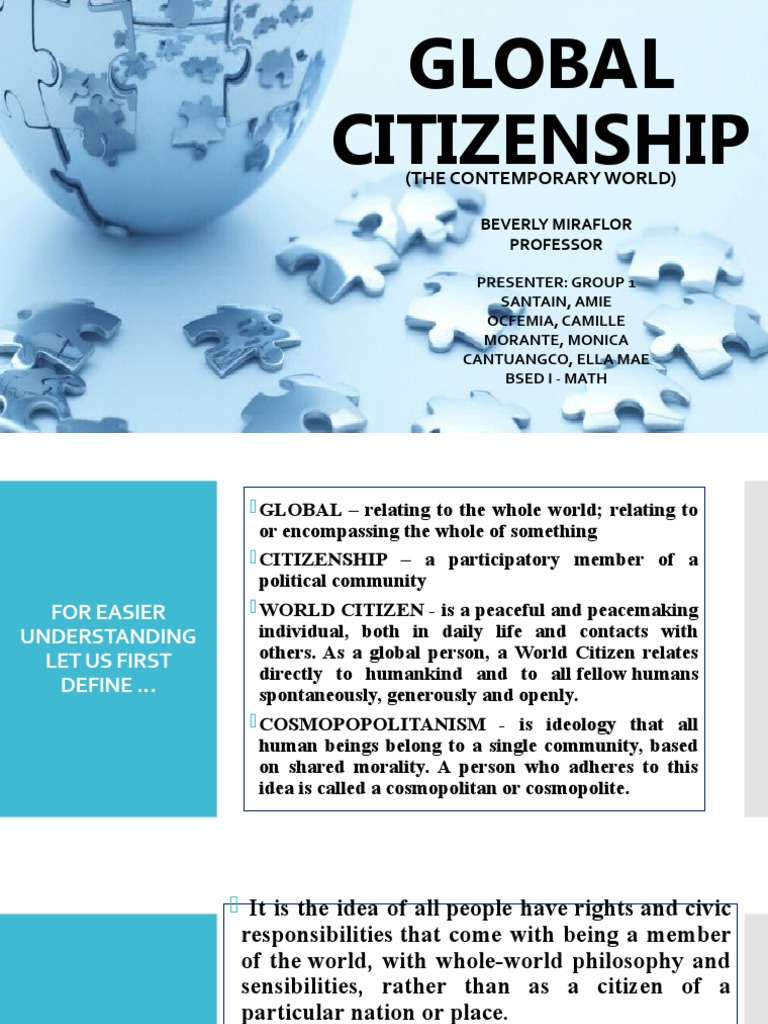In an increasingly interconnected world, the Bahá’í teachings illuminate paths toward fostering a heightened consciousness of world citizenship. This concept transcends mere loyalty to geographical borders and specific national affiliations, encouraging individuals to embrace a cosmopolitan ethos that recognizes the unity and interconnectedness of humanity. By cultivating this awareness, Bahá’í principles provide profound insights into harmonizing our shared existence.
The metaphor of the “Global Tapestry” beautifully encapsulates the essence of world citizenship. Just as individual threads contribute to the vibrancy and strength of a tapestry, so too do the myriad cultures, languages, and traditions around the globe enhance the human experience. Each individual thread, representing a distinct identity or perspective, plays an irreplaceable role in the broader canvas of life. When one appreciates the beauty of this collective design, the superficial divides of race, nationality, and religion diminish, giving way to a synthesis of shared purpose and mutual respect.
Fundamentally, Bahá’í teachings assert the oneness of humanity—a principle that stands at the core of world citizenship. This oneness invites us to acknowledge that beneath the veneer of diversity, we share a common origin and destiny. Such realizations compel individuals to transcend parochial loyalties and embrace a more extensive social identity. Recognizing that all humans are part of a singular family fosters empathy and solidarity across borders.
To instill this consciousness, education plays a paramount role. The Bahá’í Faith encourages holistic education that nurtures not only the intellect but also the character. Knowledge, when combined with ethical behavior, cultivates a sense of responsibility toward others. The youth, in particular, are seen as vital agents of change, capable of championing the cause of world citizenship through innovative action and thoughtful discourse. Engaging with diverse viewpoints allows young people to dismantle biases and build bridges across cultural divides, yielding a generation adept in the language of unity.
Moreover, the Bahá’í perspective on service is intrinsically linked to the idea of world citizenship. Service to humanity is viewed as both a privilege and a duty. Through acts of kindness, volunteerism, and community engagement, individuals contribute to the global fabric of society. This active participation fosters a profound sense of belonging and purpose. Each act of service becomes a thread in the tapestry of global unity, intricately linked to the lives of countless others. It reshapes personal narratives, reinforcing the notion that we are all stewards of each other’s well-being.
The Bahá’í approach also emphasizes the importance of dialogue, particularly in resolving conflicts. In the geopolitical landscape rife with tension, fostering open conversations across cultural and ideological divides is a transformative practice. Dialogue nurtures understanding, enabling individuals to find common ground amidst discord. Within the context of Bahá’í teachings, this is a manifestation of the principle of non-violence—promoting peaceful resolution over confrontation and cultivating relationships based on trust rather than suspicion.
It is crucial to recognize that embracing world citizenship does not imply the negation of individual identity. Instead, it celebrates the richness of cultural diversity while emphasizing the significance of mutual respect. The Bahá’í teachings encourage adherents to draw upon their unique cultural heritages as a means of enriching the collective experience. This harmonious balance between individual and collective identity fosters a vibrant global community where all voices are heard and valued.
Additionally, the concept of justice permeates the Bahá’í framework. Justice is not merely a legalistic principle but a force for equity and inclusiveness. In promoting world citizenship, Bahá’í teachings insist on the necessity of a just social order that amplifies the rights and dignity of every individual, regardless of their background. Such a justice-oriented mindset actively works to dismantle systems of oppression and inequity, paving the way for a more just and unified world.
Furthermore, the challenges of climate change and environmental degradation have emerged as pressing issues that require a global consciousness. The Bahá’í view on environmental stewardship aligns closely with the tenets of world citizenship, advocating for a sustainable future that honors the interconnectedness of all life forms. Addressing ecological crises necessitates collective action and commitment from all nations, encapsulating the notion that our destiny is intertwined with that of our planet. Each action taken today reverberates across generations, underpinning our moral obligation to protect the earth for future inhabitants.
In sum, the teachings of the Bahá’í Faith provide a robust framework for creating a consciousness of world citizenship. Through metaphors that resonate deeply, like the “Global Tapestry,” and principles that advocate for unity in diversity, the journey toward global consciousness becomes an accessible and enriching endeavor. Education, service, dialogue, justice, and environmental stewardship are not mere concepts but vital pathways toward realizing a world where every individual actively participates in the collective journey. Such aspirations may indeed seem monumental, yet they are achievable through the concerted efforts of a global community dedicated to the ideals of peace and unity.
As this global consciousness proliferates, the fabric of humanity will shimmer with vibrant hues of understanding and compassion, ultimately leading us toward a brighter, interconnected, and harmonious world.
